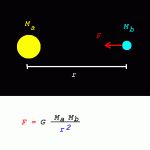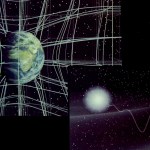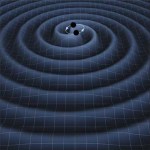General Relativity
In a validation of Albert Einstein's genius, the power of new technology, and the relevance of the scientific method (even if it takes a century), scientists working on a project called LIGO have witnessed ripples in the fabric of spacetime caused by gravitational waves. First predicted by Einstein in 1916 on the basis of general relativity, gravitational waves are cosmic shock waves that can result from the interactions of massive objects like black holes and neutron stars. Unlike electromagnetic waves, which pass through space, gravitational waves change the shape of space itself. Extremely…
Albert Einstein finished up his General Theory of Relativity in November, 1915, 100 years ago. Because we use Base 10, this is significant.
General Relativity ties together curvature in spacetime with the energy and momentum of matter and radiation. This has a lot to do with gravity. Einstein himself wrote the book on General Relativity, but it has been covered in a lot of other places as well, including a recent treatment by historian of science Tom Levenson, The Hunt for Vulcan: ... And How Albert Einstein Destroyed a Planet, Discovered Relativity, and Deciphered the Universe.
Nature…
“Light thinks it travels faster than anything but it is wrong. No matter how fast light travels, it finds the darkness has always got there first, and is waiting for it.” -Terry Pratchett
It’s the end of the week once again, and so let's have a go at another Ask Ethan! Perhaps inspired by a great giveaway, there have been so many great questions pouring in (and you can submit yours here for four more chances to win), but this week’s comes from our reader and winner Brad (you owe me your email address, Brad), who asks,
When an object is quoted as being 13.8 billion light years…
"I wouldn't know a spacetime continuum or a warp core breach if they got into bed with me." -Patrick Stewart
It's the end of the week once again, and so it's time for another Ask Ethan segment! There have been scores of good questions to choose from that were submitted this month alone (and you can submit yours here), but this week's comes from our reader garbulky, who asks:
Why does gravity decrease the further away you are from the object? I've read that it does decrease with distance squared but not why it does this.
This question seems so simple, and yet the answer -- to the…
"On a cosmic scale, our life is insignificant, yet this brief period when we appear in the world is the time in which all meaningful questions arise." -Paul Ricoeur
Ask anyone who's looked up at a dark sky on a clear, moonless night, and you'll immediately hear tales about how incomprehensibly vast the Universe is.
Image credit: Randy Halverson, flickr user dakotalapse, from http://dakotalapse.com/.
But what you're looking at isn't much of the Universe at all. In fact, practically every point of light you see, including the vast swath of stars too dim to individually resolve, comes…
"The views of space and time which I wish to lay before you have sprung from the soil of experimental physics, and therein lies their strength. They are radical. Henceforth space by itself, and time by itself, are doomed to fade away into mere shadows, and only a kind of union of the two will preserve an independent reality." -Hermann Minkowski
When it comes to gravity, you probably think you understand it pretty well.
Image credit: Heavens Above, via http://heavens-above.com/.
Everything with mass (or energy) attracts everything else with mass-or-energy, explaining everything from falling…
"The mind, once expanded to the dimensions of larger ideas, never returns to its original size." -Oliver Wendell Holmes
When General Relativity supplanted Newton's work as our theory of how gravity works in the Universe, it didn't just change how we view how masses attract, it gave us a new understanding of what the questions where and when actually mean. It gave us the very fabric of spacetime.
Image credit: Christopher Vitale of http://networkologies.wordpress.com/.
What this meant is that no longer could we view objects like matter and radiation as existing in some fixed, grid…
"When I say, 'I love you,' it's not because I want you or because I can't have you. It has nothing to do with me. I love what you are, what you do, how you try. I've seen your kindness and your strength. I've seen the best and the worst of you. And I understand with perfect clarity exactly what you are." -Joss Whedon
I bet you love science; practically all of us do, whether we realize it or not. As children, we all live as scientists, born with no knowledge or experience of this world, but with inherent ability to learn and adapt.
Image credit: ©2005-2013 ~cchhrriissttaa, of deviantART…
"The cosmos is all that is or ever was or ever will be. Our feeblest contemplations of the Cosmos stir us—there is a tingling in the spine, a catch in the voice, a faint sensation, as if a distant memory, or falling from a height. We know we are approaching the greatest of mysteries." -Carl Sagan
If you looked out at the planets in the Solar System orbiting our Sun, you'd expect that if you know where they are right now and how quickly they're moving, you can figure out exactly where they're going to be at any time-and-date arbitrarily far into the future. That's the great power that comes…
"Great spirits have always encountered violent opposition from mediocre minds." -Albert Einstein
It may be hard to believe, seeing as how it's been our leading theory of gravity for nearly a century now, but Einstein's General Relativity is possibly the most frequently challenged scientific idea of all-time. Of course, it's emerged victorious from each and every one of those challenges, making a slew of unintuitive predictions that have been spectacularly confirmed each time they've been tested.
Image credit: Miloslav Druckmuller (Brno U. of Tech.), Peter Aniol, and Vojtech Rusin.
This…
"The particle and the planet are subject to the same laws and what is learned of one will be known of the other." -James Smithson
The entirety of the known Universe -- from the smallest constituents of the atoms to the largest superclusters of galaxies -- have more in common than you might think.
Image credit: Rogelio Bernal Andreo of http://blog.deepskycolors.com/about.html.
Although the scales differ by some 50 orders of magnitude, the laws that govern the grandest scales of the cosmos are the very same laws that govern the tiniest particles and their interactions with one another on the…
"You must learn to talk clearly. The jargon of scientific terminology which rolls off your tongues is mental garbage." -Martin H. Fischer
I've always thought that the Universe is absolutely amazing; that everything from the tiniest indivisible particles all the way up to the largest structures and superstructures making up the Universe has an amazing story to tell, if only we can figure out its secrets.
Image credit: Boylan-Kolchin et al. (2009) for the Millenium-II simulation; MPA Garching.
When I first learned some of them for myself, I was a graduate student, immersed in the minutiae and…
"There is a single light of science, and to brighten it anywhere is to brighten it everywhere." -Isaac Asimov
One of the most spectacular and successful ideas of the 20th Century was Einstein's General Relativity, or the idea that matter and energy determines the curvature of spacetime, and the curvature of spacetime in turn determines how gravitation works.
Image credit: Hyper-Mathematics - Uzayzaman / Spacetime.
From the orbits of planets to the bending of starlight, General Relativity governs all gravitational phenomena in the Universe, and accurately describes every observation we've…
In which I talk about the common complaint that we teach students physics that "isn't true," and the limits on that statement.
------------
Frequent commenter Ron sent me an email pointing to this post by David Reed on "What we “know” that t’aint so…. and insist on teaching to kids!":
he science we teach is pretty old. Mostly 19th century ideas about the world around us are taught as “facts” with little but anecdotal data to support it. We teach it via an ontology that replays the history of science, thus the newest and most powerful scientific understandings are viewed as “too advanced”. If…
A scientific theory hasn't really arrived until the cynical and unscrupulous find a way to use it to extract money from the credulous and gullible. This has posed a significant obstacle for general relativity, dealing as it does with gravity, which requires really gigantic masses to produce measurable effects. That makes it a little difficult to sell wacky general relativity-based schemes to people.
Until now, anyway-- recent advances in atomic clocks have made it possible to see relativistic effects on a human scale. There was a really nice talk on this experiment in the fundamental symmetry…
Yesterday's post on a variation of the "Twin Paradox" with both twins accelerating was very successful-- 337 people voted in the first poll question, as of a little before 9am, and the comments to the original post are full of lively discussion. That's awesome.
I wish I could take credit for it, but the problem posed is not original to me. It comes from a 1989 paper in the American Journal of Physics, which also includes the following illustration setting up the situation:
The article contains a full explanation, and also the following figure illustrating the result:
The correct answer is…
A day or two ago, I posted my nomination for the greatest mystery in all of physics: why is it that the "gravitational charge" (i.e. how strongly you couple to the gravitational field) is identically equal to your inertial mass (i.e. how strongly you resist being pushed around by any kind of force)?
Einstein's General Relativity is our modern theory of gravity, and it answers this question in an extremely satisfying and elegant manner. Specifically, gravity is not a force at all; it's the geometry of spacetime. All objects move through spacetime in as straight a line as they can; if they…
Because this is me, I must start with a lot of disclaimers. First, the title is catchy, but many would disagree with the mystery I've identified. Even I might. So, please try to avoid flaming me for my choice. Second, very shortly I will post "The Most Elegant Solution In All Of Physics," a post that might allow one to argue that what I'm about to identify as the greatest mystery isn't a mystery at all! Groundwork laid, here we go....
In physics, there is this quantity "mass" that we use to describe how much "stuff" there is in a particle. Technically speaking, "mass" is the energy…












